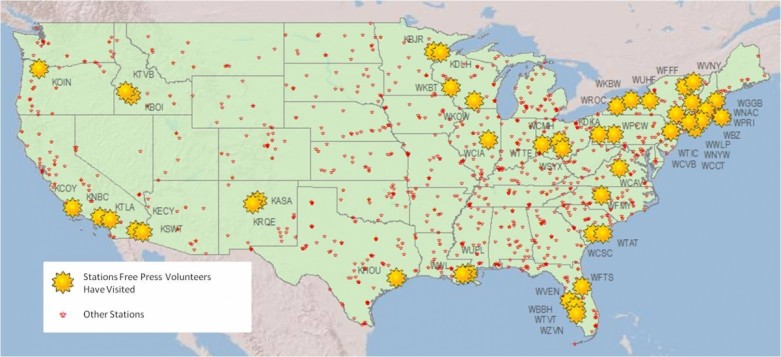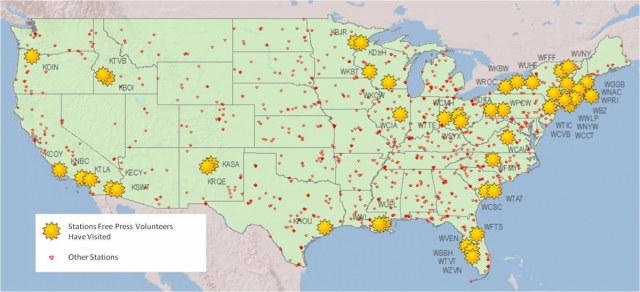
Let the Sun Shine In
Earlier this month, we issued a challenge to our members. We asked them to take a day off from work, visit their local television stations and … rifle through their filing cabinets.
It’s not the most glamorous gig, but over 100 people all over the country came forward to volunteer. The public files our television stations are required to maintain can give us insights into the inner workings of the political ad machine. They can also help us understand how each media outlet serves — or fails to serve — its community.
We’re grateful that people have been willing to roll up their sleeves and risk a few paper cuts to bring valuable information out of filing cabinets and into the light of day. Thanks to our volunteers, Free Press had collected materials from 50 TV stations in 21 states as of March 23.
And this is just the beginning.

Free Press volunteers across the country volunteered to inspect the files at their local stations.
Spreading Sunshine from Coast to Coast
Our muckraking volunteers descended on their local stations en masse in honor of Sunshine Week. Now in its eighth year, Sunshine Week is a nationwide effort that calls attention to the need for transparency in government. In this post-Citizens United era, it’s important that we have access to information about political ad spending. Most of the money from political contributions is spent on televised political ads, and broadcasters make enormous profits from these spots. The public deserves to know just how much stations make from bombarding viewers with ads — and just how little of that revenue is used to produce quality election coverage.
Information about who pays for political ad time, how much they pay for it, and how stations serve their communities is already publicly available, at least technically. It’s part of the deal broadcasters made with the American people in exchange for free use of the public airwaves. But the files are available only in paper form, and only at local TV stations. The Federal Communications Commission wants to put the public files online to make them easier to access, but broadcasters are fighting this common-sense initiative. What are they hiding?
Free Press and our volunteers were determined to find out.
Overwhelming Response
In the spirit of transparency, I should say that we had our doubts about this endeavor. It’s hard enough to get most people to sign an online petition. Inspecting a broadcaster’s public files is, as we say in the organizing world, a “heavy lift”; it requires taking time off of work, traveling great distances and paying for copies.
We were blown away by the response we received to our call for volunteers. My inbox overflowed with passionate emails from activists all over the country. Some were aware that the files hold the key to understanding the money influencing our elections and wanted to help us follow the political money trail. People who depend on broadcast TV for news and information volunteered because they are fed up with the cheap, cookie-cutter coverage their stations provide. One mother signed up to inspect files with her two children as a civics lesson.
Sunshine Week Begins
Inspecting a public file is complicated. We kicked off Sunshine Week with in-depth trainings for participants, armed them with how-to guides and checklists and sent them out to visit their local stations.
As our intrepid volunteers discovered, it’s not easy to find out who is advertising on a local station, or what public interest programming is provided to your community, even if you’ve had extensive training beforehand. We worked with volunteers throughout the week to overcome the challenges they faced. We reminded volunteers of their rights when station staff claimed the files weren’t public, or when staff said people would be turned away if they showed up without an appointment. We helped volunteers find solutions when stations charged them $1 per page for photocopies. We also helped volunteers verify that they were collecting the right information from files that were disorganized or incomplete.
Not all volunteers faced serious roadblocks. Many volunteers were greeted by friendly staff who showed them well-organized files. These volunteers were able to collect the most valuable information about how their stations serve their communities and who is buying political ad time to influence local voters. Volunteers were surprised to learn how much political ad money flows in from out of state, just how little news and information stations provide — and just how many of their local stations are now operated by former competitors.
Moving Forward
The success of our Sunshine Week initiative has inspired us to expand our efforts to inspect public files nationwide. In addition to training more volunteers, Free Press will offer specialized trainings to journalists and allies. We will collect as many files as we can from as many stations as possible, analyze the data and contribute our findings to the New America Foundation’s growing database of public files.
By inspecting files from stations all over the country, we will build a case for digitizing this information that no amount of broadcaster whining can overcome.
We welcome you to join us. Visit our action center to learn more.
If you care about transparency, please consider a donation to the Free Press Action Fund. Thank you.
Map created by Lynn Scharf